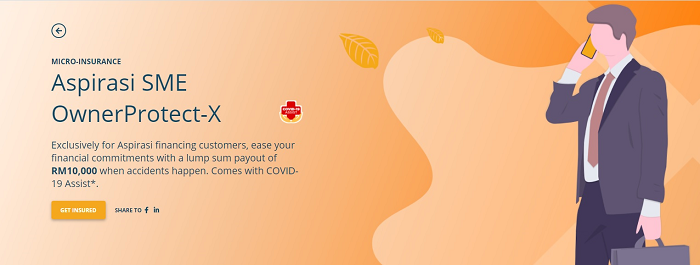Axiata Digital’s Aspirasi sees financing & insurtech as enabler for SME digitisation
By Tan Jee Yee August 14, 2020
- Aspirasi Assist utilises platform & ecosystem to bridge financing gaps for MSMEs
- 80% of businesses that took up financing have restarted businesses after MCO

Covid-19’s effects on the global economy will be far-reaching and devastating. But while we can expect large organisations and businesses to weather through, what’s more concerning are the millions of micro, small and medium enterprises (MSMEs) in Southeast Asia that are in peril.
As noted by the World Economic Forum (WEF), MSMEs are considered crucial to the future economic success of many SEA countries, where they have been growing rapidly and account for a vast majority of establishments in the region.
The International Federation of Accountants (IFAC) states that SMEs account for between 89% and 99% of total establishments, and contribute between 52% and 97% of employment in the ten ASEAN member states.
The Covid-19 pandemic and the resulting lockdowns in each country has left many of these businesses in a lurch.
While the governments of each ASEAN nation have been implementing various stimulus packages to soften the blow, not every MSME will be fortunate enough to land this support. To fill those gaps, organisations like the WEF believe in turning to fintech.
Fintech’s core strengths – ease, speed, convenience and reach – can allow MSMEs of any sort to gain financial services and aid.
Changing access to finance
 In Malaysia, financing is an issue faced by many MSMEs from the B40 (the bottom 40% of income earners) group. Considering that 70% of them rely on their savings or borrow from friends and family, according to a report by the Ministry of Finance, the pandemic has meant a severely limited financial runway for them to weather the socio-economic storm.
In Malaysia, financing is an issue faced by many MSMEs from the B40 (the bottom 40% of income earners) group. Considering that 70% of them rely on their savings or borrow from friends and family, according to a report by the Ministry of Finance, the pandemic has meant a severely limited financial runway for them to weather the socio-economic storm.
Thankfully, fintech is able to extend a saving hand. One leading player is Malaysia’s first fully digital fintech financier, Aspirasi, a company under Axiata Digital which itself is a subsidiary of Axiata Group. As part of Axiata Group’s Covid-19 Assistance Program launched in later March, Aspirasi launched its Aspirasi Assist which offers Shariah-compliant micro-financing with favourable terms for MSMEs.
Aspirasi’s executive director Sheyantha Abeykoon (pic) sees this as a way to complement the many efforts and schemes available through traditional banks and financial institutions aimed at helping MSMEs.
“Everyone out there is doing a great job. The advantage we have is that we already have a digital platform that has already long disbursed to people in need. We complement them [traditional financial institutions] with quick, easy application. I think that helps a lot,” he tells Digital News Asia.
Aspirasi Assist disburses from a US$35.7 million (RM150 million) cash fund, which includes an initial contribution of US$4.8 million (RM20 million) from the Ministry of Finance. MSMEs will be able to access loans in the range of RM1,000 to RM10,000 with a six-month waver and a concessionary rate.
[RM1 = US$0.238]
The initiative was initially targeted at providing financial assistance to businesses under Axiata’s ecosystem, especially business registered with Axiata-owned Boost e-wallet, which numbered around 150,000 at end April and Celcom which has around 75,000 SME customers. Not surprisingly, market response has been strong enough that Aspirasi Assist is now available to businesses beyond Axiata’s ecosystem. They have also upped the maximum loan amount to RM20,000 to meet market demand.
Aspirasi Assist ticks the boxes of fintech’s core strength in helping bridge financial inclusivity during the Covid-19 crisis. MSMEs only need to undergo a quick three-minute online application process. If approved, funding will be made available in 48 hours to their bank accounts. The process is entirely digital, which means it can be accessed anywhere.
Reaching out
Aspirasi has already been providing micro-financing solutions ranging from working capital to invoice financing and supply chain financing to small businesses for almost a year and a half before Covid-19 struck.
That they can provide financial aid at such relative ease and promptness is because they’ve had time to test and refine their platform, Sheyantha says. There is a balance to achieve between convenience and safety, however.
The application process requires basic information and KYC (know your customer) details, but in a way that meets Aspirasi’s requirements without overly burdening the applicants. “It’s a trade-off,” Sheyantha notes. Their experience prior to Covid-19, however, ensures that they are able to know exactly how much information they need to score their applications, and at the same time ensure a seamless journey.
The bigger challenge here is ensuring that the program reaches the people in need. Most B40 MSMEs operate in non-urban and rural areas, and while Sheyantha is confident that they can be reached digitally, there’s also a need to convince businesses that Aspirasi is here to help.
According to him, besides Aspirasi’s own media outreach and advertising, they are also working with a lot of local bodies, local authorities and government agencies to ensure that they are reaching all the right people. This is on top of working with partners on both the Boost and Aspirasi platforms, which ensures that they have contact and reach with most businesses that can then communicate the advantage of Aspirasi Assist down the line.
“Some of these partners have relationships with these small businesses, and can then provide a certain level of endorsement for this product,” Sheyantha explains.

Other means of assistance
Aspirasi’s assistance doesn’t just end with Assist. Their portfolio of products, which existed before Covid-19, are also designed for SMEs in mind. Aspirasi Capital X provides financing up to RM100,000 with one-time repayment within 60 days at profit rate up to 1.5% per month. Further details of this can be obtained here.
[Para updated for accuracy.]
Then there’s Aspirasi Invoice, and invoice financing scheme of up to RM150,000 with repayment from seven days to 90 days, with interest rates up to 1.5% per month. Aspirasi Credit, on the other hand, is their supply chain financing scheme of up to RM150,000.
And then there’s Aspirasi’s insurtech offerings, which they are providing through a partnership with Great Eastern. Introduced late last year, Sheyantha says that their insurtech offerings are scaling up this year. Like their financing offerings, their insurance products are geared towards small businesses.
Sheyantha notes that MSMEs face different business risks, which is why Aspirasi came up with packages as part of their financing offerings, essentially making the insurance products more affordable. Signing up for Aspirasi Capital, for instance, allows you to add-on Aspirasi SME OwnerProtect-X (which provides a lump sum payment of RM10,000 when accidents happen) as a feature.
About 50% of customers who take up their financing products also took up insurance coverage. “We can see that a lot of small businesses see value in it,” notes Sheyantha.
Value in fintech
It also seems that businesses in Malaysia are seeing the value in fintech financing and insurtech. Sheyantha adds that they saw an uptake on their other financial products during the movement control order (MCO) period in Malaysia, especially in small businesses that sell products digitally and businesses serving logistics in the value chain.
(The MCO, which began on 18th March still exists but as the Recovery MCO with less restrictions.)
“A lot of them have to suddenly ramp up capacity. Those who have to reach customers online now have to think about delivery service. Those that conduct WhatsApp commerce have to figure out how to do payment,” says Sheyantha. Naturally, they need financing to ramp up, and Aspirasi is there to provide this.
If anything, this has softened the blow of Covid-19. Sheyantha says that having talked to their customers, they find that 80% of those who have taken up their financing during the height of the pandemic have restarted their businesses. About another 10%, Sheyantha says, are about to get their businesses started in the coming months.
Going forward, Aspirasi will be working closely with sister company Boost as well as ecosystem players and government agencies to focus on digitising SMEs. “The big thrust in the next months is to help small businesses become digital, and we see financing and insurtech as an enabler for that,” he says.
“We have platforms like Boost, where we can help customers be digital. We want to see ourselves as an enabler to digitise small businesses.”
Related Stories :


